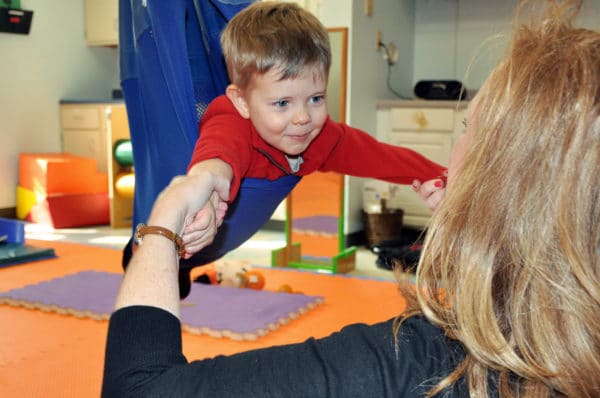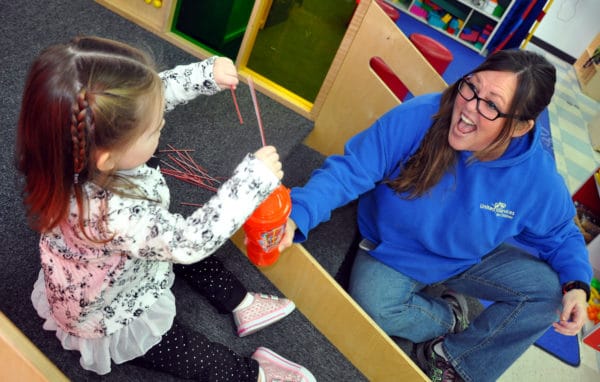April is Occupational Therapy Month!
But what is Pediatric Occupational Therapy?
The primary goals of childhood are to grow, learn, and play. It is often through play that children learn to make sense of the world around them. It is a child’s “job” or “occupation” to play to develop physical coordination, emotional maturity, social skills to interact with other children, and self-confidence to try new experiences and explore new environments. The act of playing is an important tool that influences a child’s life. A child’s life is made up of “occupations,” or daily activities. These occupations include playing, learning, and socializing. Occupational therapy practitioners work with children and their families to help them succeed in these activities throughout the day. (AOTA, 2018)
If therapy is done right, it looks like a fun play session! However, there is a purpose for each activity. An OT must know all domains of development at all ages to be able to intentionally provide intervention that will result in skill achievement. Additionally, pediatric OT’s have a strong knowledge base about medical diagnoses and how children may be impacted. During a therapy session, an OT is constantly evaluating the child’s performance to adjust the activities to provide a just right challenge.
At United Services we provide OT for children ages 0-15 years of age. We work in our early intervention program with children who are in First Steps. Our outpatient program, Uncommon Grace, serves children in individual and small group settings. All insurances, including Medicaid is accepted. Support from the Variety Club is also available for therapy visits.
If you would like talk with an OT, please call US at 636-926-2700!

The Process
A referral for OT will begin with an appointment for an evaluation. Assessments will be given by an occupational therapist based on the challenges the child is experiencing and the input of the caregiver. Results are discussed and together a treatment plan with goals is developed in conjunction with the caregiver. Throughout therapy, goals are reviewed and the treatment plan is updated. Caregivers are a crucial part of the therapy team and are encouraged to participate in all aspects of therapy as well as carry-over activities outside of the therapy session.
Below are examples of common diagnoses and goal areas; this list is not inclusive. OT’s can work with a child with any diagnosis.
OT for children with Autism:
Children with delayed social and communication skills may have accompanying challenges with sensory processing that impacts his/her ability to engage in typical developmental activities. Common goals addressed by OT:
- *Sensory Processing
- Joint attention and engagement/Social Skills
- Play skills with toys
- Play skills with peers
- Balance, strength, reflex integration
- Self-care skills
- Self-feeding and acceptance of a variety of foods
OT for children with Cerebral Palsy
Children with CP may experience challenges with movement due to muscular imbalances. Therapy to facilitate typical movement patterns for developmental activities.
Common goals addressed by OT:
- Facilitate movement patterns to engage in developmental tasks
- Grasping activities for learning to draw/write, use scissors, self-care activities.
- Postural control and strength for a strong base/core while doing activities
- Provide adaptive equipment as needed to facilitate function
- Oral motor skills for self-feeding and safe chewing and swallowing
- Visual motor-perceptual skills to make sense of the world
- *Sensory Processing
*Sensory Processing Challenges
Some children have difficulty taking in sensory information, making sense of the information and/or using the information for an appropriate motor response. Sensory issues can present within the areas of: Touch-Tactile, Visual Processing, Hearing, Proprioception/Body Awareness, Vestibular/Movement, and Smell. Goals are designed to specifically address the needs of each child. For more information watch: https://www.youtube.com/watch?v=1_Iuj8dr9oY
Common goals addressed by OT:
- Self-regulation
- Responses to under or over sensitivity
- Motor Planning/coordination
- Postural control and balance
- Developmental skills
- Adaptive skills
- Social skills
Children with Down Syndrome
Children with Down Syndrome frequently have low muscle tone an strength. Sometime therapy is needed to facilitate age appropriate skills and motor milestones.
Common goals addressed by OT:
- Strengthening
- Development of fine-motor skills
- Sensory Processing
- Postural Control
- Self-Care skills
- Feeding
Developmental Delay
A general term of developmental delay may be used to describe when a child is challenged to achieve age appropriate skills.
Common goals addressed by OT:
- Strengthening and balance
- Sensory Processing
- Self-Care
- Fine-Motor
- Visual Motor
- Social Skills

